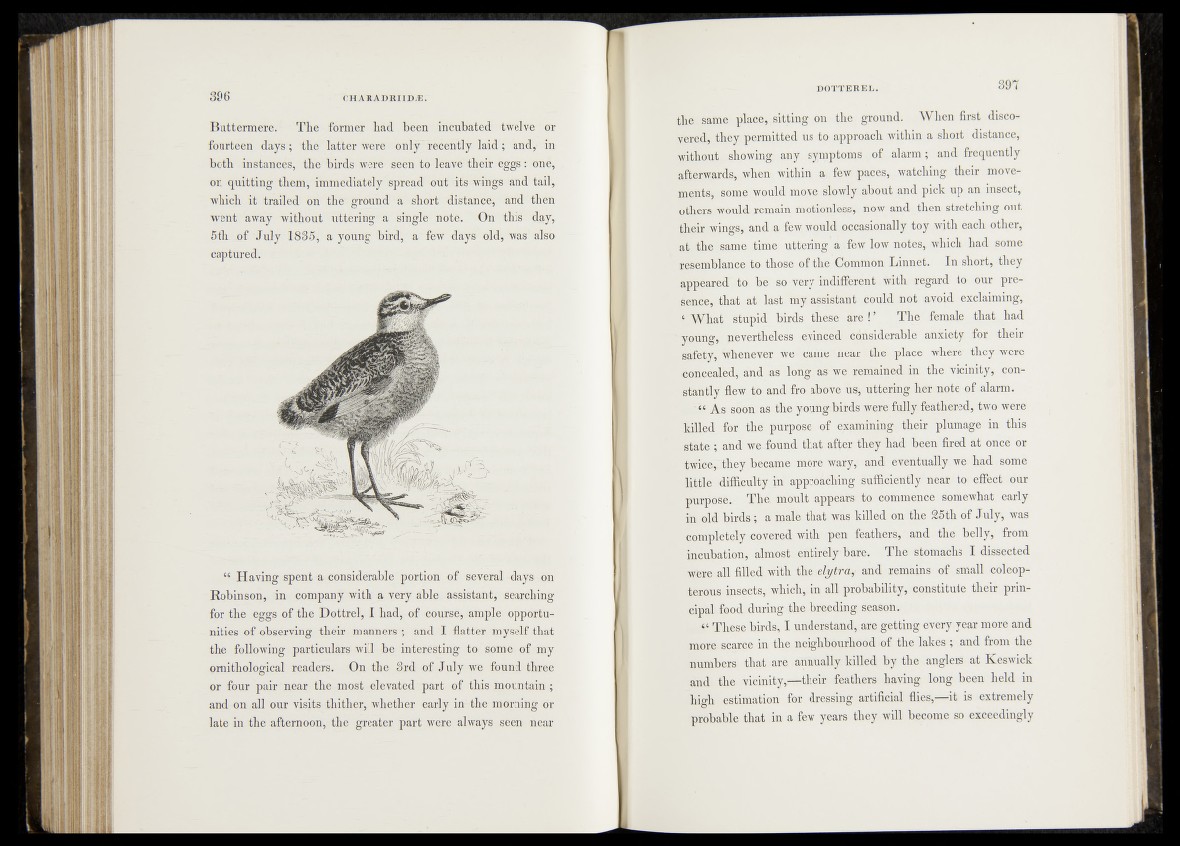
Buttermere. The former had been incubated twelve or
fourteen days; 'the latter were only'recently laid ; and, in
both instances, the birds were seen to leave their eggs :' one,
on quitting them, immediately spread out its wings and tail,
which it trailed on the ground a short distance, and then
went away without uttering a single note. On this dgy,
5th. .of July 1835, a young bird, a few days old, was also
captured.
“ Having spent a considerable portion of several da-yg^on
Robinson, in company with a very able, assistant, searching
for the eggs of the Dottrel, 1 had, of course, ample opportunities
of observing their manners; and I flatter myself that
the following particulars will be interesting to some of my
ornithological readers. On the 3rd' of July we found three
or four pair near the most elevated part of this mountain ;
and on all our visits thither, whether early in' the morning or
late in the afternoon, the greater part were always seen near
the same place, sitting on the ground. When first discovered,
they permitted us to approach within a short distance,
without showing any symptoms of alarm; and frequently
afterwards, when within, a few paces, watching their movements*
some would move slowly about and pick up an insect,
others would remain motionless, now and then stretching out
their wings, and a few would occasionally toy with each other,
at the same time uttering a few low notes, which had some
resemblance to those of the Common Linnet» In short, they
appeared to be so very indifferent with regard to our presence,
that at last my assistant could not avoid exclaiming,
‘ What stupid birds these are !’ The female that had
' young, nevertheless .evinced considerable anxiety for their
safety, whenever we came near the place where they were
concealed, and as long as-we remained in the vicinity, constantly
flew to and fro above us, uttering her note of alarm.
*«< As soon.as the young birds were fully feathered, two were
.killed for the purpose of examining their plumage in this
state ; and we-found that after they had been fired at once or
twicephey became more Wary,- and eventually we had some
little difficulty in approaching sufficiently near to effect our
;! purpose. The. moult appears to commence somewhat early
in old birds; a male that was killed on the 25th of July, was
completely covered with pen feathers, and the belly, from
incubation, almost entirelybare. The stomachs I dissected
whre all filled with the elytra,- and remains of small coleopterous
insects, which,, in all probability, constitute their principal
food during the breeding season. „■
. “ These birds, I understand, are getting every year more and
more scarce in the neighbourhood of the lakes ; and from the
numbers that-are annually; killed by the anglers at Keswick
and the vicinity,;—their feathers having long been held in
high estimation for dressing artificial flies,— it is extremely
probable that in a few years they will become so exceedingly